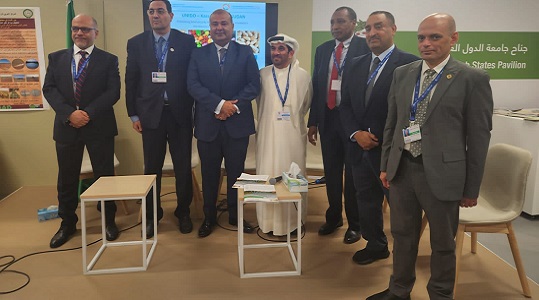The Secretary-General of the Union of Arab Chambers, Dr. Khaled Hanafi, explained during a session organized by the Union of Arab Chambers as part of the COP28 activities, held at Expo Dubai in cooperation with the League of Arab States, the Arab Organization for Agricultural Development, and the Arab Academy for Science, Technology and Maritime Transport, that the cost borne by the consumer and the Arab economy from supply inefficiency reaches 30 percent, and this is a very large number, which calls for finding solutions that reduce the cost of the supply chain, whether incurred through sea, land or even air imports.
He pointed out that the supply chain process goes through several stages, first through requesting the agricultural product by sending electronic signal messages from the Arab region to the supplier located in South America, the United States of America, Europe, etc. In order for these messages to be delivered, you need to study the carrier’s trickle-down capacity, especially through sea transport, and how there can be a maximization of the efficiency of sea transport, given that this part of the supply chain is very expensive.
He continued: After the first stage comes the loading and unloading process, as when the boat docks at the port of arrival in the Arab region, it needs several days to unload, which may reach 10 days and perhaps a little less. Therefore, every day of unloading delay costs a large number to the Arab consumer, who mainly suffers from inflation and the high cost of living. Then comes the storage stage, where upon arrival the goods need good storage in order to then be distributed to the local consumer or re-exported.
He stressed that in the context of talking about the issue of food security, it is necessary to address the reality of local agricultural production, or what is called “agricultural logistics”. This ensures the accurate and timely supply of water, fertilizers, and pesticides, and this cannot happen without using the tools of the Fourth Revolution, such as obtaining a sufficient and appropriate amount of fertilizer at a sufficient and appropriate time. For example, it must be digital signals coming from the farm to the supplier. At this stage introducing models related to agricultural logistics so that the farmer is not required to be an expert in the world of agricultural technology, as it only requires readings that can be collected via BIG DATA to be sent later at an appropriate time so that the agricultural product can be transported at an appropriate cost.
The Secretary-General of the Union explained that the cost of transporting and storing agricultural fertilizers is a very important part of the issue of production cost, as using a sufficient amount of fertilizers for plants, for each agricultural area, and for limited agricultural areas can only be achieved through the use of modern technology.
He considered that the term “agricultural logistics” is how it is possible to deal with transportation, supply, delivery, and receiving information from the agricultural product so that it reaches the appropriate destination appropriately. Stressing that when talking about the issue of food security, we must address the traditional and modern model, as the traditional aspect in terms of production itself, production methods, and water is an essential matter that cannot be overlooked in the issue of food security. In addition, the part related to supply chains, logistics, and trading is a part that is of great consideration, and therefore, to achieve Arab food security, it is necessary to work on these two paths (traditional and modern) as they are complementary to each other.
Dr. Khaled Hanafi touched on the topic of agricultural growth poles through projects in which economic empowerment takes place, as the idea of entrepreneurship and incubation in the field of agriculture is vital. We at the Union of Arab Chambers pay great attention to it and work with all our potential and capabilities in cooperation with Arab and international organizations to maximize the role of Arab entrepreneurs through networking with foreign entrepreneurs. In this regard, the Arab-African Conference, which will be held in the city of Dakhla in the Kingdom of Morocco on December 20, will be an important opportunity for Arab and African entrepreneurs to raise the level of cooperation between them in a way that serves common development goals and interests.
Kindly click here to view the presentations
Source (Union of Arab Chambers)

